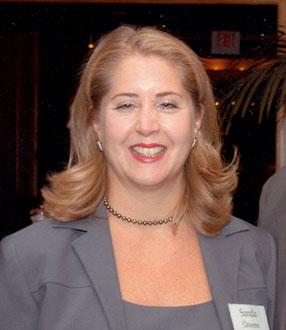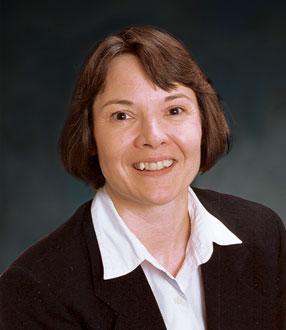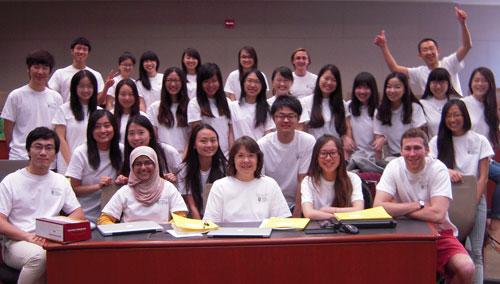Groome and Tice receive inaugural Teaching Awards
A legal studies instructor who sends her students into New Orleans courtrooms to help improve the city’s criminal justice system and a finance professor whose students are actively managing more than $3 million in Tulane University endowment funds are the first recipients of a new award that recognizes the best in teaching at the A. B. Freeman School of Business.


Sanda Groome, professor of practice in business and legal studies, received the first Teaching Excellence Award for Undergraduate Education, while Sheri Tice, professor of finance, received the first Teaching Excellence Award for Graduate Education. Dean Ira Solomon announced the awards, which include a $5,000 cash prize, at a faculty meeting in September.
“This was not an easy decision,” Solomon says. “[Senior Associate Dean] Paul Spindt and our six area coordinators submitted more than a dozen nominees, and each one deserved commendation for outstanding teaching. Ultimately, Sanda and Sheri stood out, and they stood out in large part for their efforts on behalf of Court Watch NOLA and the Darwin Fenner Fund, two unique, high-value experiential learning projects.”
Groome began teaching at the Freeman School in 2006, and in 2008, she joined the full-time faculty as a professor of practice. In 2009, she began a collaboration with Court Watch NOLA, a not-for-profit that monitors judges and reports on the efficiency of the New Orleans criminal justice system. As part of Groome’s Legal Studies service learning course, students go to court and take notes on how judges preside over criminal trials. Those notes are then incorporated into Court Watch reports, which serve as a valuable resource for voters during elections.
“Court Watch isn’t pro-state or pro-defense or even pro-court,” says Groome. “We just observe what’s going on. If you see that a judge has canceled court on many days or if he or she is always late, that will come out in the report.”
Besides helping to promote transparency and accountability in the criminal justice system, Groome says the program offers students valuable insights about the judicial system.
“Most student have never been in a courtroom before,” says Groome. “What they’re expecting is what they’ve seen on TV and in movies, and they quickly learn that it’s not really like that. I think it gives them a much better idea of the criminal court system, and it also shows them how the system affects not just the person on trial, but the victim, the families and the community.”
Tice joined the Freeman School in 1998, and has served as the A. B. Freeman Chair of Finance since 2011. In 2002, she took over the directorship of a dormant student investment fund and made it the centerpiece of an invitation-only honors seminar. Students in the Darwin Fenner Student Managed Fund course read current academic papers and use that research to develop models to screen sectors and identify mispriced stocks. At the end of the semester, students vote on which stocks in the $3 million fund to buy, hold and sell.
“I’m not a big believer in just standing up and lecturing whatever they can read in a textbook,” Tice says. “Instead, we discuss assigned academic research papers in class, and then the students apply what they’ve learned using real money and real stocks.”

Based on the fund’s performance, that approach seems to be working. Since 2002, the undergraduate-managed large-cap portfolio has beaten the market by 1.3 percent per year while the mid-cap portfolio, managed by MBA and MFIN students, has outperformed the market by 1.67 percent per year, both without taking on any additional risk using traditional risk measures. The program has been so successful that a small-cap portfolio was spun off this year to enable more students to take the class.
While a number of other schools have student-managed funds, Tice says the Darwin Fenner Fund is unique for involving both undergraduates and graduate students and for its emphasis on leading-edge research.
“To me, a great professor is someone who is able to bring research alive in the classroom,” Tice says. “I think that’s where the experiential learning component helps. Students struggle with reading the research papers, but when you tell them they have to invest a large amount of money and understanding these papers is going to enable them to be at the cutting edge and compete against the smartest people on Wall Street, it gives them an extra incentive and they learn the material.”
The Teaching Excellence Award is an outgrowth of the Freeman School’s recent strategic planning process. A faculty task force recommended consolidating the school’s various teaching recognitions into two awards—one each at the undergraduate and graduate levels—that recognize faculty members who are excellent educators and whose teaching aligns with the school’s strategic objectives.
Under the newly established system, area coordinators nominate faculty members within their respective areas, and those nominations are then supplemented with recommendations from the senior associate dean. Among the criteria to be considered are student evaluations, the extent to which the faculty member integrates academic research into his or her teaching, and whether the course provides high-impact experiential learning opportunities for students.
“Teaching is one of the most important activities in which we engage at the Freeman School, so it’s important for us to acknowledge and formally honor outstanding classroom instruction,” says Solomon. “Sanda and Sheri are true exemplars of teaching excellence, so I’m happy to be able to recognize and honor them as the first recipients of this award.”
Interested in advancing your education and/or career? Learn more about Freeman’s wide range of graduate and undergraduate programs. Find the right program for you.
Other Related Articles
- Politico: Trump administration moves closer to opening Venezuela to more US oil producers
- HuffPost: Psychologists Say Your Airplane Seat Choice Reveals Way More Than You Realize About Your Personality
- Alumna recalls trailblazing career in business, ministry
- Quartz: What it would take for Trump to drag Big Oil back into Venezuela
- DW News: Can the Fed stay independent under Trump?
- Alum brings rugby mindset to new consulting program
- Harvard Business Review: Why AI Boosts Creativity for Some Employees but Not Others
- Forbes: How To Talk Politics With Family Over The Holiday
